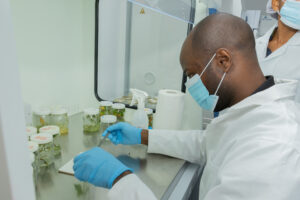Conference calls for African scientific sovereignty, renewed investment in research capabilities

The African Academy of Sciences’ (AAS) 15th Bi-Annual General Assembly and Scientific Conference held in Abuja, Nigeria, has ended with calls for African scientific sovereignty and renewed investment in the continent’s research capabilities.
The four-day event, themed “Empowering and Advancing Africa’s Scientific Enterprise,” featured prominent voices in African science and development policy.
In a remark, Professor Kevin Chika Urama, Chief Economist and Vice President of the African Development Bank Group (AfDB), highlighted Africa’s rich scientific heritage, and emphasised the urgent need for reform in how the continent approaches scientific enterprise.
“Africa had great beginnings in shaping global science and technology,” Professor Urama noted, citing historical achievements from early toolmaking to astronomical observations.
“However, the current state of STI in Africa raises many questions. Less than 1 percent of all patents granted worldwide in 2023 were for African individuals or enterprises.”
The conference comes at a crucial time, with AAS President Professor Lise Korsten reporting a 135 per cent increase in African scientific publications between 2014 and 2022.
Despite this progress, Prof Urama emphasised several substantial challenges facing the continent.
He pointed to the continued marginalization of African scientific knowledge and voice in global discourse, in addition to the persistent underfunding of research institutions with most African countries still falling short of the African Union’s 1 per cent GDP investment target for Research and Development.
The situation is further complicated by a significant brain drain, with annual losses of approximately $2 billion in the health sector alone in the continent, according to the Mo Ibrahim Foundation.
Prof Urama explored strategies to enhance the productivity and relevance of Africa’s scientific enterprise to Africa’s development. He emphasized the importance of restoring confidence in African science and scientists while accelerating public and private investments in R&D and scientific infrastructure to enhance factor productivity in Africa.
His recommendations include reforming monetary and fiscal policies to make scientific investments more attractive, reorienting research toward practical solutions for African development challenges, leveraging brain circulation and international partnerships, and mobilizing domestic savings and capital for science and innovation.
Professor Friday Okonofua, AAS Secretary-General emphasised the conference’s comprehensive approach to rebranding the Academy and enhancing its impact on Africa’s development.
“Together we can make African Scientists work for Africa’s development,” Urama concluded, emphasising the need for Africa to build its scientific and technological capabilities to avoid remaining “an impoverished appendage to the global economy.”
Source: GNA
